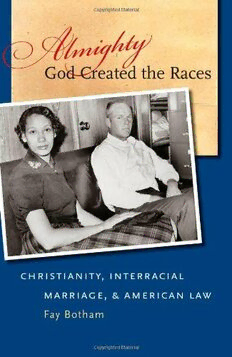
Almighty God Created the Races: Christianity, Interracial Marriage, and American Law PDF
288 Pages·2009·1.305 MB·English
Most books are stored in the elastic cloud where traffic is expensive. For this reason, we have a limit on daily download.
Preview Almighty God Created the Races: Christianity, Interracial Marriage, and American Law
Description:
In this fascinating cultural history of interracial marriage and its legal regulation in the United States, Fay Botham argues that religion--specifically, Protestant and Catholic beliefs about marriage and race--had a significant effect on legal decisions concerning miscegenation and marriage in the century following the Civil War. Botham argues that divergent Catholic and Protestant theologies of marriage and race, reinforced by regional differences between the West and the South, shaped the two pivotal cases that frame this volume, the 1948 California Supreme Court case of Perez v. Lippold (which successfully challenged California's antimiscegenation statutes on the grounds of religious freedom) and the 1967 U.S. Supreme Court case Loving v. Virginia (which declared legal bans on interracial marriage unconstitutional). Botham contends that the white southern Protestant notion that God "dispersed" the races, as opposed to the American Catholic emphasis on human unity and common origins, points to ways that religion influenced the course of litigation and illuminates the religious bases for Christian racist and antiracist movements.
See more
The list of books you might like
Most books are stored in the elastic cloud where traffic is expensive. For this reason, we have a limit on daily download.
